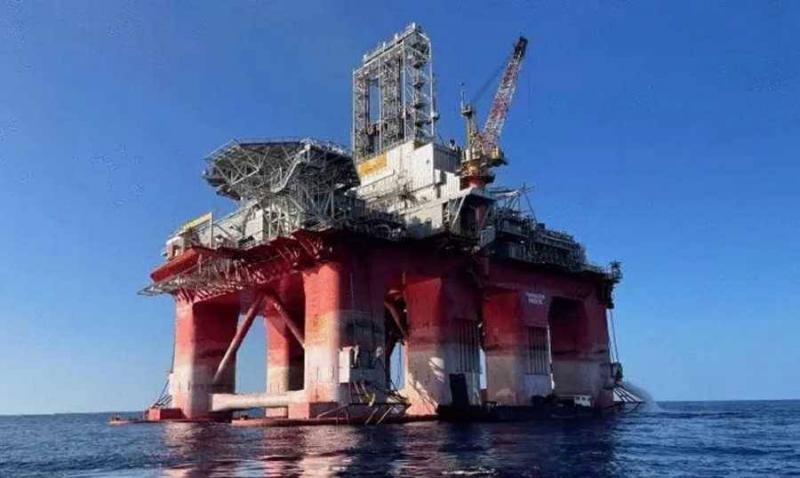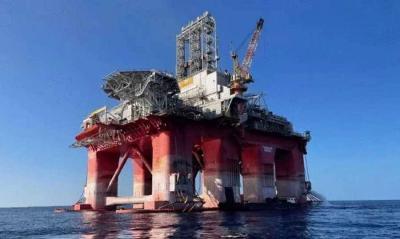French company "Total" has not submitted a copy of its final report to the Lebanese government regarding the results of the drilling in the first exploratory well in the Qana field, located in Block 9 of Lebanon's offshore blocks, which was supposed to be provided by the end of February 2024. This is despite reliable information that the report is ready, indicating that Total is retracting its commitments to the Lebanese state. Previously, it misled the government into thinking it was interested in investing in blocks 8 and 10, only to refuse to sign contracts for exploration and extraction in these blocks after the government made amendments aimed at accelerating drilling and investment, instead of prolonging it, as Total had previously proposed for years ahead, as reported by "Ad-Diyar."
The month of February has passed, and we are now approaching mid-March, but Total, as the operator of the consortium signed with the Lebanese state for exploration and extraction in Block 9, has not bothered to send a team to clarify its "ambiguous" position regarding exploration in blocks 8 and 10, nor about drilling a second well in Block 9. The excuse given is the instability of the security situation in Lebanon and the region, while it appears unwilling for Lebanon to quickly benefit from its oil wealth before receiving the green light from the United States.
Informed political sources indicate that the Lebanese state does not hold companies accountable based on intentions but rather on performance, dealing with global oil companies according to laws, agreements, and contracts. So far, Total Energy, which leads the consortium alongside the Italian Eni and Qatari Qatar Energy, has not shown encouraging results, drilling one well each in blocks 4 and 9 and announcing the absence of commercially discoverable gas reserves in both. Additionally, its final position on drilling in Block 9, which it completed before the scheduled time last October, has not yet resulted in the submission of a detailed report to the state regarding the results of this operation.
Despite this "unclear" performance from Total, the Lebanese state remains open to the consortium if it applies for the third licensing round, which began on December 27 and continues until July 2, provided it adheres to the terms this time. It’s worth noting that Total applied to the second licensing round with a request that did not meet the terms from close or far, prompting the Ministry of Energy and the Oil Sector Management Authority to make amendments to encourage exploration in blocks 8 and 10. However, Total refused to sign the contract, compelling the government to be cautious in any future agreements to ensure the commencement of works, to avoid future delays and procrastination that would hinder the oil sector in Lebanon.
Sources believe that the Lebanese state should not rely this time on the consortium, which is awaiting a signal from Washington to improve performance. This has been made clear through statements by U.S. mediator Amos Hochstein during his recent visit to Beirut, who linked the issue of border demarcation with the resumption of work in the oil and gas file in Lebanese blocks. Consequently, the state is trying to attract new companies, having adjusted its conditions to achieve this goal and broadly open the door to smaller oil companies to participate in the third licensing round and meet Lebanese conditions.
The new licensing round, which ends on July 2, allows Lebanon not to lose more time in exploring its sensitive offshore blocks, especially given their geographic location and the ongoing conflict in the south with Israel. Currently, 9 out of 10 blocks available for leasing are included, particularly with the "consortium" monopolizing Block 9, as it has not yet decided whether to drill a second well there. Total benefits from the contract signed with the Lebanese state, which ends on May 25, 2025, allowing for further delays in decision-making until the end of the first exploration period in Block 9, thus fulfilling its contractual obligation to drill this well.
Therefore, work in Block 9 is officially frozen until the contract with the consortium ends in May next year and is not only frozen due to the ongoing war in Gaza and southern Lebanon but also officially until next summer, i.e., until the expiration date of the third licensing round. If no company applies by July 2, exploration for gas and oil in Lebanese blocks will remain frozen, leading to an extension of the licensing period for several additional months. Should a company apply, the process of contract unbundling and study before awarding the contract to the winning company requires time. This means there will be no exploration for oil and gas in the Lebanese blocks at least until next summer, regardless of connections to the ongoing war or politics.
According to the sources, Total's failure to discover gas or oil in Lebanese blocks undermines its credibility, while Eni, part of the consortium, has successfully discovered the largest gas reservoir in Egypt and has also succeeded in Cypriot blocks. Therefore, the sources find it puzzling that Total would yield to U.S. pressures, even though Washington has a stake in the matter, at the expense of its skills and long experience in the field of gas and oil exploration and extraction.




